与名人对话 模拟采访梁思成 英文
梁思成工匠精神英语作文
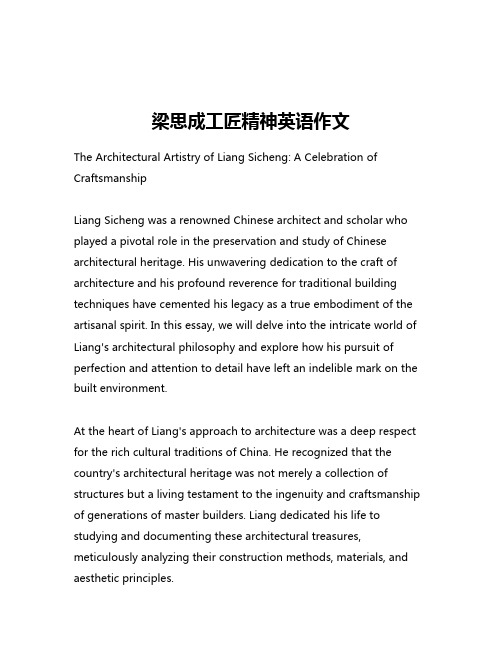
梁思成工匠精神英语作文The Architectural Artistry of Liang Sicheng: A Celebration of CraftsmanshipLiang Sicheng was a renowned Chinese architect and scholar who played a pivotal role in the preservation and study of Chinese architectural heritage. His unwavering dedication to the craft of architecture and his profound reverence for traditional building techniques have cemented his legacy as a true embodiment of the artisanal spirit. In this essay, we will delve into the intricate world of Liang's architectural philosophy and explore how his pursuit of perfection and attention to detail have left an indelible mark on the built environment.At the heart of Liang's approach to architecture was a deep respect for the rich cultural traditions of China. He recognized that the country's architectural heritage was not merely a collection of structures but a living testament to the ingenuity and craftsmanship of generations of master builders. Liang dedicated his life to studying and documenting these architectural treasures, meticulously analyzing their construction methods, materials, and aesthetic principles.One of Liang's most significant contributions was his role in the preservation of traditional Chinese architecture. He was a tireless advocate for the protection of historic buildings, recognizing that they were not only physical manifestations of the past but also repositories of cultural knowledge and artistic expression. Liang's efforts led to the establishment of the Chinese Society for the Preservation of Cultural Relics, which played a crucial role in safeguarding numerous architectural masterpieces from the ravages of time and modernization.However, Liang's influence extended far beyond the realm of preservation. He was also a gifted designer and architect, whose works seamlessly blended traditional Chinese aesthetics with modern functionality. Liang's designs were renowned for their meticulous attention to detail and their reverence for the craftsmanship of the past. He believed that every architectural element, from the intricate carvings on a wooden beam to the precise placement of a roof tile, held deep symbolic and practical significance.One of Liang's most celebrated works is the Qionghua Bridge in Hangzhou, a masterpiece of traditional Chinese bridge-building. The bridge's graceful arches and delicate ornamentation are a testament to Liang's deep understanding of the principles of Chinese architecture. He worked closely with a team of skilled craftsmen,guiding them through the intricate construction process and ensuring that every detail was executed with the utmost precision.Liang's commitment to craftsmanship extended beyond his own designs. He was a passionate educator who sought to instill the values of traditional Chinese architecture in the next generation of architects and builders. Liang established the first comprehensive architectural education program in China, where he emphasized the importance of hands-on experience and a deep understanding of traditional building techniques.Under Liang's guidance, students were trained in the art of timber framing, stone carving, and the intricate construction of traditional roofs and facades. They were encouraged to not only master the technical aspects of the craft but also to develop a deep appreciation for the cultural significance and artistic merit of the buildings they were creating.Liang's legacy as a champion of craftsmanship is further reflected in his writings and scholarship. His seminal work, "The Architectural Art of Ancient China," remains a cornerstone of architectural education and research, serving as a comprehensive guide to the rich history and techniques of traditional Chinese construction.Through his writings, Liang sought to bridge the gap between thepast and the present, encouraging contemporary architects to draw inspiration from the wisdom of their ancestors. He believed that the true essence of architecture lay not just in the final product but in the journey of its creation – a journey marked by patience, precision, and a reverence for the craft.In an era of rapid urbanization and technological advancement, Liang's message of craftsmanship and cultural preservation remains as relevant as ever. As the world grapples with the challenges of sustainability and the preservation of architectural heritage, Liang's example serves as a powerful reminder of the enduring value of artisanal skill and the importance of honoring the traditions that have shaped the built environment.Through his life's work, Liang Sicheng has left an indelible mark on the field of architecture, inspiring generations of designers and builders to uphold the highest standards of craftsmanship and to embrace the rich cultural legacy that underpins the built environment. His legacy serves as a testament to the power of the artisanal spirit and the profound impact that can be achieved when passion, skill, and a reverence for tradition converge in the pursuit of architectural excellence.。
介绍梁思成的英语作文
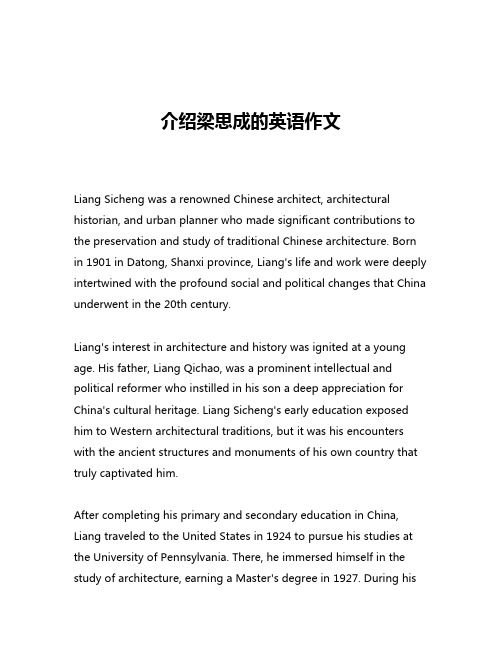
介绍梁思成的英语作文Liang Sicheng was a renowned Chinese architect, architectural historian, and urban planner who made significant contributions to the preservation and study of traditional Chinese architecture. Born in 1901 in Datong, Shanxi province, Liang's life and work were deeply intertwined with the profound social and political changes that China underwent in the 20th century.Liang's interest in architecture and history was ignited at a young age. His father, Liang Qichao, was a prominent intellectual and political reformer who instilled in his son a deep appreciation for China's cultural heritage. Liang Sicheng's early education exposed him to Western architectural traditions, but it was his encounters with the ancient structures and monuments of his own country that truly captivated him.After completing his primary and secondary education in China, Liang traveled to the United States in 1924 to pursue his studies at the University of Pennsylvania. There, he immersed himself in the study of architecture, earning a Master's degree in 1927. During histime in the US, Liang had the opportunity to learn from some of the most renowned architects and urban planners of the era, including Paul Cret and Hubert Ripley.Upon his return to China in 1928, Liang began his lifelong mission to document, preserve, and promote the architectural treasures of his homeland. He joined the faculty of Northeastern University in Shenyang, where he established the country's first formal program in architectural education. Liang's teaching and research activities during this period laid the groundwork for his later achievements.In 1932, Liang was invited to join the faculty of Tsinghua University in Beijing, where he would spend the majority of his academic career. At Tsinghua, Liang founded the Department of Architecture and played a pivotal role in shaping the curriculum and research agenda. He also established the journal Architectural Review, which became a leading platform for the dissemination of ideas and scholarship on Chinese architecture.One of Liang's most significant contributions was his groundbreaking work on the documentation and preservation of China's ancient architectural heritage. In the 1930s, he embarked on a series of extensive field surveys, traveling to remote regions of the country to study and record the design, construction, and historical significance of traditional Chinese buildings. These efforts resulted inthe publication of several landmark works, including the monumental "A Pictorial History of Chinese Architecture" and "Chinese Architecture: A Pictorial History."Liang's work not only shed light on the rich diversity and sophistication of traditional Chinese architecture but also served as a clarion call for its protection. At a time when many historic structures were being demolished or neglected, Liang advocated tirelessly for the establishment of a comprehensive system of architectural preservation in China. His efforts led to the creation of the country's first national heritage protection law in 1961, which laid the foundation for the conservation of cultural relics and historic sites.Liang's influence extended beyond the realm of academia and preservation. He was also a prominent figure in the field of urban planning, working to shape the development of cities in China. In the 1950s, he served as the chief architect for the planning of the new capital city of Tianjin, where he sought to balance the demands of modernization with the preservation of traditional architectural elements.Throughout his career, Liang faced numerous challenges and setbacks, including political persecution during the turbulent years of the Cultural Revolution. However, his unwavering commitment to his work and his vision for the future of Chinese architecture neverwavered. Even in the face of adversity, he continued to push forward, driven by a deep-seated belief in the importance of preserving the country's cultural heritage.Liang's legacy extends far beyond his own lifetime. His pioneering research and advocacy have inspired generations of architects, historians, and preservationists in China and around the world. The institutions and programs he helped establish, such as the Department of Architecture at Tsinghua University, continue to shape the field of architectural education and research in China.Moreover, Liang's influence can be seen in the growing global appreciation for traditional Chinese architecture. His work has helped to shed light on the beauty, complexity, and cultural significance of these structures, inspiring a renewed interest in their preservation and integration into contemporary design.Today, Liang Sicheng is widely regarded as one of the most influential figures in the history of Chinese architecture. His contributions to the field have left an indelible mark, and his legacy continues to inspire and guide those who seek to honor and preserve the architectural treasures of China.。
梁思成英文介绍作文

梁思成英文介绍作文Liang Sicheng, also known as S.C. Liang, was aprominent Chinese architect and scholar. He was born in1901 in Tokyo, Japan, and later moved to the United Statesto study architecture at the University of Pennsylvania. After returning to China, he became known for his work in preserving and documenting traditional Chinese architecture.Liang Sicheng was a key figure in the architectural preservation movement in China. He was instrumental in the protection of many important historical sites, includingthe Great Wall and the Forbidden City. His efforts helpedto raise awareness about the importance of preservingChina's architectural heritage.In addition to his work in preservation, Liang Sicheng was also a prolific writer and educator. He co-authored the influential book "History of Chinese Architecture" with his wife, Lin Huiyin, and taught at several universities in China. His writings and teachings had a significant impacton the study and practice of architecture in China.Liang Sicheng's legacy continues to be celebrated in China and beyond. His contributions to the fields of architecture and preservation have left a lasting impact, and he is remembered as a pioneer in the effort to protect China's cultural heritage.。
采访名人的英语对话
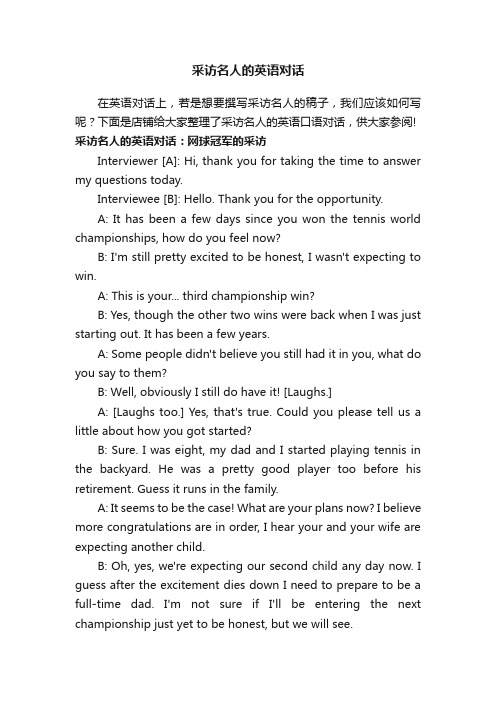
采访名人的英语对话在英语对话上,若是想要撰写采访名人的稿子,我们应该如何写呢?下面是店铺给大家整理了采访名人的英语口语对话,供大家参阅! 采访名人的英语对话:网球冠军的采访Interviewer [A]: Hi, thank you for taking the time to answer my questions today.Interviewee [B]: Hello. Thank you for the opportunity.A: It has been a few days since you won the tennis world championships, how do you feel now?B: I'm still pretty excited to be honest, I wasn't expecting to win.A: This is your... third championship win?B: Yes, though the other two wins were back when I was just starting out. It has been a few years.A: Some people didn't believe you still had it in you, what do you say to them?B: Well, obviously I still do have it! [Laughs.]A: [Laughs too.] Yes, that's true. Could you please tell us a little about how you got started?B: Sure. I was eight, my dad and I started playing tennis in the backyard. He was a pretty good player too before his retirement. Guess it runs in the family.A: It seems to be the case! What are your plans now? I believe more congratulations are in order, I hear your and your wife are expecting another child.B: Oh, yes, we're expecting our second child any day now. I guess after the excitement dies down I need to prepare to be a full-time dad. I'm not sure if I'll be entering the next championship just yet to be honest, but we will see.A: Well, I for one hope to see you on the court again. It was a magnificent win. Thank you very much for your time, and good luck with your new kid!B: I will certainly think about it. And thank you.采访名人的英语对话:采访科比You:Hi,Kobe!Congratulations on winning the game of the LAL to OKC.It is beautiful.Kobe:Thank you!I think so.This is the sixth victory of our team.I really enjoy this game.You:Well,can I ask you some questions?Kobe:Sure!You:Although you won, but it's also a narrow victory of 113-110, where do you think you still need to improve? Such as?Kobe:Yes.I thinkI think our team has a lot of problems.Rival attack, our team getting too late, or interior defense is not tight, however our offense, seems a bit "in the coarse fine"。
与名人对话英文作文
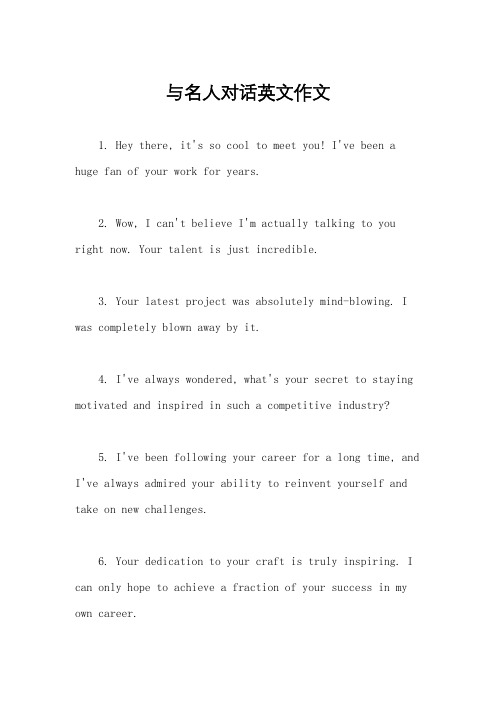
与名人对话英文作文1. Hey there, it's so cool to meet you! I've been a huge fan of your work for years.2. Wow, I can't believe I'm actually talking to you right now. Your talent is just incredible.3. Your latest project was absolutely mind-blowing. I was completely blown away by it.4. I've always wondered, what's your secret to staying motivated and inspired in such a competitive industry?5. I've been following your career for a long time, and I've always admired your ability to reinvent yourself and take on new challenges.6. Your dedication to your craft is truly inspiring. I can only hope to achieve a fraction of your success in my own career.7. It's amazing to see how much impact you've had on your fans and the industry as a whole. You're a true icon.8. I've always been curious, what's the most valuable lesson you've learned throughout your career?9. Your ability to connect with people through your work is something I really admire. How do you manage to create such powerful and relatable art?10. Thank you so much for taking the time to chat with me. It's been an absolute honor.。
最喜欢的建筑师梁思成英语作文
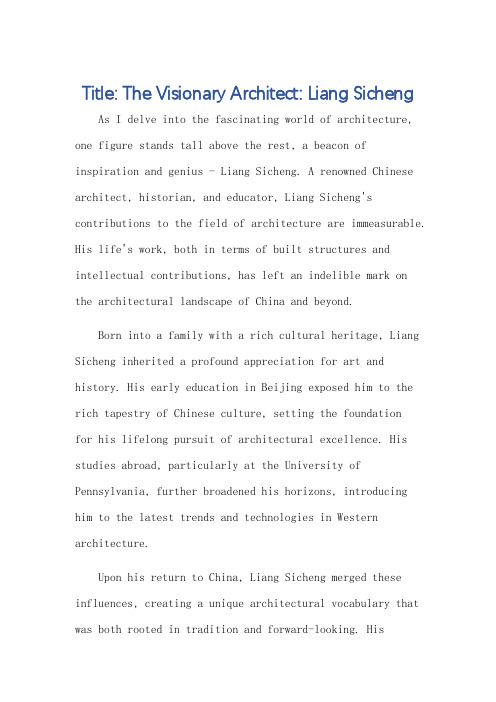
Title: The Visionary Architect: Liang Sicheng As I delve into the fascinating world of architecture, one figure stands tall above the rest, a beacon ofinspiration and genius - Liang Sicheng. A renowned Chinese architect, historian, and educator, Liang Sicheng's contributions to the field of architecture are immeasurable. His life's work, both in terms of built structures and intellectual contributions, has left an indelible mark onthe architectural landscape of China and beyond.Born into a family with a rich cultural heritage, Liang Sicheng inherited a profound appreciation for art and history. His early education in Beijing exposed him to the rich tapestry of Chinese culture, setting the foundationfor his lifelong pursuit of architectural excellence. His studies abroad, particularly at the University of Pennsylvania, further broadened his horizons, introducing him to the latest trends and technologies in Western architecture.Upon his return to China, Liang Sicheng merged these influences, creating a unique architectural vocabulary that was both rooted in tradition and forward-looking. Hisdesigns were not mere replicas of the past but rather innovative reinterpretations that respected the spirit of Chinese architecture while embracing modern sensibilities. His masterful blend of old and new, east and west, made his buildings stand out as timeless icons of architectural excellence.One of Liang Sicheng's most renowned projects is the renovation of the Forbidden City in Beijing. His meticulous attention to detail and respect for the original structure were evident in every aspect of the renovation. His team restored the grandeur of the imperial palace while ensuring its structural integrity and historical authenticity. This remarkable feat not only preserved a national treasure but also showcased Liang Sicheng's exceptional skills as an architect.Beyond his architectural achievements, Liang Sicheng was also a prolific scholar and writer. His works on Chinese architecture, such as "The History of Chinese Architecture" and "Images of Chinese Architecture," arestill considered authoritative sources on the subject. His meticulous research and passion for documentation ensuredthat the rich heritage of Chinese architecture would not be forgotten.Liang Sicheng's legacy is not just in the buildings he designed or the books he wrote. It is also in the generations of architects and scholars he inspired. His dedication to excellence, his respect for tradition, and his embrace of innovation have become the guidingprinciples for many architects in China and beyond. His visionary approach to architecture continues to influence the way we understand and appreciate the built environment. In conclusion, Liang Sicheng was not just a great architect; he was a cultural ambassador of China, a preservationist of historical heritage, and a mentor to many. His life's work is a testament to the power of architecture to connect the past with the future, to unite different cultures, and to create enduring legacies. His vision and genius continue to inspire architects and non-architects alike, making him a timeless figure in the annals of architectural history.**梁思成:远见卓识的建筑师**在探索建筑这一迷人领域的过程中,一位人物鹤立鸡群,成为灵感和天才的象征——梁思成。
名人采访对话式范文英语

名人采访对话式范文英语Interviewer: Thank you for joining us today, Emma. It’s a pleasure to have you here.Emma Watson: Thank you for having me! I’m excited to be here.Interviewer: Let’s start with your journey in acting. You became famous as Hermione Granger in the Harry Potter franchise at such a young age. How did you cope with the pressures of fame as a child?Emma Watson: It was quite overwhelming at times. I had to learn to balance my personal life and my public persona. My family played a crucial role in keeping me grounded. They reminded me of my values and the importance of staying true to myself.Interviewer: That’s really inspiring. After Harry Potter, you took on various roles and also pursued higher education. Why was it important for you to continue your studies?Emma Watson: Education has always been a priority for me.I wanted to equip myself with knowledge and skills beyond acting. Attending Brown University was a transformative experience. It helped me grow intellectually and personally, providing me with a broader perspective on life.Interviewer: You are also known for your work in women's rights. What motivated you to become such a strong advocatefor gender equality?Emma Watson: I believe in the power of education and dialogue. When I was appointed as a UN Women Goodwill Ambassador, I realized that I could use my platform to raise awareness. The HeForShe campaign emphasized that gender equality is not just a women’s issue; it’s a human rights issue that affects everyone.Interviewer: Can you tell us about some challengesyou’ve faced in your activism?Emma Watson: Of course. One of the biggest challenges is combating the criticism and backlash that come with speaking out. It can be discouraging, but I remind myself of the importance of perseverance. Engaging with people who have opposing views can also be tough, yet it’s essential for fostering understanding.Interviewer: What advice would you give to young people who want to make a difference in their communities?Emma Watson: I would encourage them to be courageous and proactive. Every small action counts. Educate yourself about the issues that matter to you, get involved with local organizations, and connect with like-minded individuals. Change often starts at the grassroots level.Interviewer: Finally, what’s next for you? Any upcoming projects you’re excited about?Emma Watson: I have a few exciting projects in the pipeline, but I’m also focusing on my advocacy work. I want to continue raising awareness and inspiring action around gender equality. Balancing my career and activism is crucial to me, and I’m looking forward to what the future holds.Interviewer: Thank you, Emma. Your insights and dedication are truly admirable.Emma Watson: Thank you! It was great speaking with you.。
采访名人英语作文
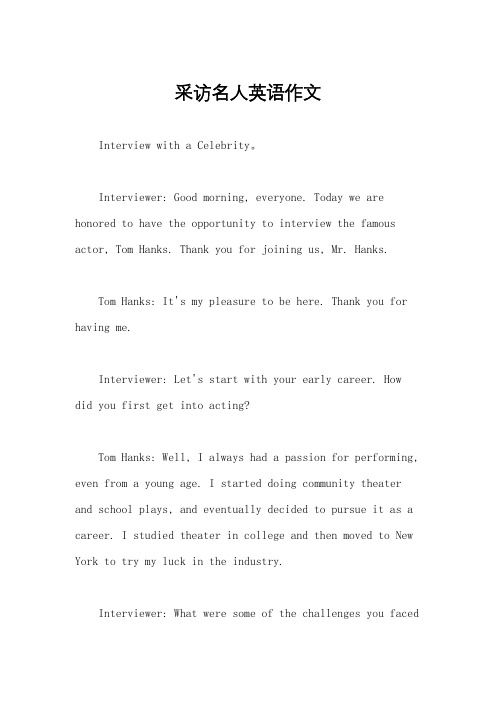
采访名人英语作文Interview with a Celebrity。
Interviewer: Good morning, everyone. Today we are honored to have the opportunity to interview the famous actor, Tom Hanks. Thank you for joining us, Mr. Hanks.Tom Hanks: It's my pleasure to be here. Thank you for having me.Interviewer: Let's start with your early career. How did you first get into acting?Tom Hanks: Well, I always had a passion for performing, even from a young age. I started doing community theater and school plays, and eventually decided to pursue it as a career. I studied theater in college and then moved to New York to try my luck in the industry.Interviewer: What were some of the challenges you facedin the early days of your career?Tom Hanks: Like many actors, I faced a lot of rejection and struggled to make ends meet. It took a lot of hard work and perseverance to finally start getting roles in films and television.Interviewer: Your breakthrough role came in the 1980s with the TV show "Bosom Buddies" and the movie "Big." How did those experiences shape your career?Tom Hanks: "Bosom Buddies" was my first big break, and it taught me a lot about the industry and the craft of acting. "Big" was a turning point for me, as it showed that I could carry a film as a leading man. It opened up a lot of doors for me in Hollywood.Interviewer: You've had a diverse career, starring in everything from comedies to dramas to action films. What attracts you to a particular role?Tom Hanks: I look for roles that challenge me and allowme to explore different aspects of the human experience. Whether it's a complex character in a drama or a lighthearted role in a comedy, I want to push myself as an actor and connect with audiences in meaningful ways.Interviewer: Your performances have earned you critical acclaim and numerous awards, including two Academy Awards for Best Actor. How do you approach your craft to consistently deliver such powerful performances?Tom Hanks: I approach each role with a lot of research and preparation. I try to fully understand the character and their motivations, and then bring as much truth and authenticity to the performance as possible. I also work closely with directors and fellow actors to bring out the best in each other.Interviewer: You've also ventured into producing and directing. What inspired you to take on these roles behind the camera?Tom Hanks: I've always been interested in the creativeprocess of filmmaking, and producing and directing allow me to be involved in every aspect of a project. It's a different kind of challenge, but one that I find incredibly rewarding.Interviewer: In addition to your work in film, you are also known for your philanthropy and advocacy. What causes are you most passionate about?Tom Hanks: I believe in using my platform to raise awareness and support important causes, such as education, environmental conservation, and veterans' issues. I thinkit's important to give back and make a positive impact in the world.Interviewer: Looking ahead, what are your goals and aspirations for the future?Tom Hanks: I hope to continue telling meaningfulstories through film and to inspire and entertain audiences for many years to come. I also want to continue using my voice to make a difference in the world and leave apositive legacy.Interviewer: Thank you for sharing your insights with us, Mr. Hanks. It has been a pleasure speaking with you.Tom Hanks: Thank you for having me. It's been a pleasure.。
最喜欢的建筑师梁思成英语作文

最喜欢的建筑师梁思成英语作文I have always been fascinated by the work of the renowned Chinese architect Liang Sicheng. His contributions to the field of architecture and his dedication to preserving China's cultural heritage have left a lasting impact on the world of design and urban planning.Liang Sicheng was born in 1901 in Tokyo, Japan, wherehis father, Liang Qichao, was in exile. He later moved to China and studied architecture at the University of Pennsylvania in the United States. After completing his studies, Liang returned to China and began his career as an architect and educator.One of Liang's most significant contributions to the field of architecture was his work in preserving China's ancient buildings and historic sites. Along with his wife, Lin Huiyin, Liang conducted extensive research ontraditional Chinese architecture and worked tirelessly to document and protect these important cultural landmarks. His efforts led to the creation of the first comprehensive survey of China's architectural heritage, which has beeninvaluable in the preservation and restoration of historic sites.In addition to his preservation work, Liang also made significant contributions to modern Chinese architecture. He was a proponent of the "New Culture Movement," which aimed to modernize Chinese architecture while still maintaining its traditional elements. Liang's designs combined Western architectural principles with traditional Chinese techniques, creating a unique and harmonious blend of styles.Liang Sicheng's influence on the field of architecture extends beyond his own designs and preservation efforts. He was also a dedicated educator who trained a new generation of architects and urban planners. His teachings emphasized the importance of understanding and respecting China's architectural heritage while also embracing innovation and modernity.In conclusion, Liang Sicheng's legacy as an architect, preservationist, and educator has had a profound impact on the world of architecture. His dedication to preserving China's cultural heritage and his innovative approach todesign continue to inspire architects and urban planners around the world. His work serves as a reminder of the importance of preserving and celebrating the rich architectural traditions of our past while also embracing the opportunities of the future.我一直对著名的中国建筑师梁思成的工作深感着迷。
英语采访国外明星对话作文
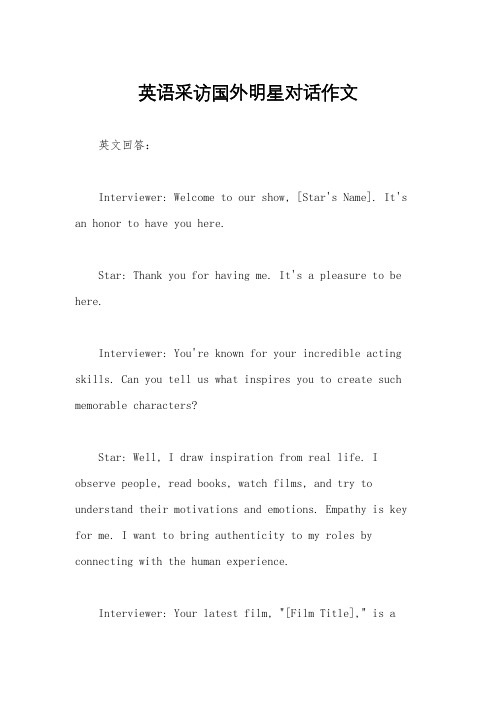
英语采访国外明星对话作文英文回答:Interviewer: Welcome to our show, [Star's Name]. It's an honor to have you here.Star: Thank you for having me. It's a pleasure to be here.Interviewer: You're known for your incredible acting skills. Can you tell us what inspires you to create such memorable characters?Star: Well, I draw inspiration from real life. I observe people, read books, watch films, and try to understand their motivations and emotions. Empathy is key for me. I want to bring authenticity to my roles by connecting with the human experience.Interviewer: Your latest film, "[Film Title]," is amasterpiece. What was the most challenging aspect of playing the lead role?Star: The most challenging aspect was capturing the character's inner turmoil. The character goes through a lot of emotional upheavals, and it was important for me to convey that range of emotions believably. It required a lot of preparation and emotional depth.Interviewer: You've worked with some of the biggest names in Hollywood. What's it like to collaborate with such talented individuals?Star: It's a dream come true. I learn so much from every collaboration. I'm constantly inspired by their professionalism, creativity, and dedication. It's an incredible experience to exchange ideas and create something truly special together.Interviewer: What advice would you give to aspiring actors?Star: Follow your passion relentlessly. Acting is a challenging profession, but it's also incredibly rewarding. Embrace the process, learn from your experiences, and never give up on your dreams. Remember, you are the only one who can define your limits.Interviewer: Thank you for sharing your insights with us. It's been a privilege.Star: Thank you for having me. It's been a pleasure.中文回答:采访者,欢迎来到我们的节目,[明星姓名]。
最喜欢的建筑师梁思成英语作文
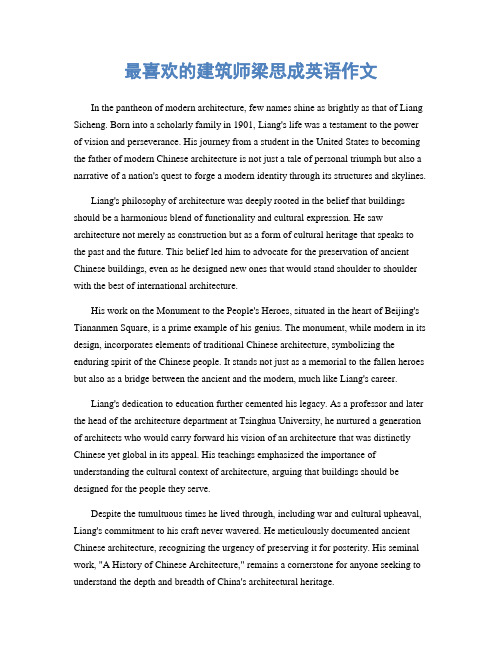
最喜欢的建筑师梁思成英语作文In the pantheon of modern architecture, few names shine as brightly as that of Liang Sicheng. Born into a scholarly family in 1901, Liang's life was a testament to the power of vision and perseverance. His journey from a student in the United States to becoming the father of modern Chinese architecture is not just a tale of personal triumph but also a narrative of a nation's quest to forge a modern identity through its structures and skylines.Liang's philosophy of architecture was deeply rooted in the belief that buildings should be a harmonious blend of functionality and cultural expression. He saw architecture not merely as construction but as a form of cultural heritage that speaks to the past and the future. This belief led him to advocate for the preservation of ancient Chinese buildings, even as he designed new ones that would stand shoulder to shoulder with the best of international architecture.His work on the Monument to the People's Heroes, situated in the heart of Beijing's Tiananmen Square, is a prime example of his genius. The monument, while modern in its design, incorporates elements of traditional Chinese architecture, symbolizing the enduring spirit of the Chinese people. It stands not just as a memorial to the fallen heroes but also as a bridge between the ancient and the modern, much like Liang's career.Liang's dedication to education further cemented his legacy. As a professor and later the head of the architecture department at Tsinghua University, he nurtured a generation of architects who would carry forward his vision of an architecture that was distinctly Chinese yet global in its appeal. His teachings emphasized the importance of understanding the cultural context of architecture, arguing that buildings should be designed for the people they serve.Despite the tumultuous times he lived through, including war and cultural upheaval, Liang's commitment to his craft never wavered. He meticulously documented ancient Chinese architecture, recognizing the urgency of preserving it for posterity. His seminal work, "A History of Chinese Architecture," remains a cornerstone for anyone seeking to understand the depth and breadth of China's architectural heritage.Liang's influence extends beyond the structures he helped preserve or the buildings he designed. It lies in the way he thought about space, culture, and history. He believed that architecture was a living art, one that evolves with society but also helps shape it. His vision was one of balance—between the old and the new, the functional and the beautiful, the national and the international.In reflecting on Liang Sicheng's contributions, one cannot help but be inspired by the elegance of his designs, the depth of his scholarship, and the strength of his character. His life's work serves as a reminder that architecture, at its best, is a reflection of humanity's highest aspirations. It is a form of immortality, capturing the spirit of an age and the dreams of its people.As we walk through the cities and towns shaped by his vision, we are walking through the pages of a history that Liang helped write. The buildings stand as silent witnesses to a man who saw beyond the bricks and mortar to the soul of a nation. In every line, curve, and column, there is a story, a piece of Liang Sicheng's enduring legacy.In conclusion, Liang Sicheng's impact on architecture is immeasurable. His work bridged the gap between tradition and modernity, and his teachings continue to inspire architects around the world. His life reminds us that buildings are more than structures; they are the keepers of history, the markers of culture, and the canvases of innovation. Liang Sicheng's favorite architect may well have been the one he saw in the mirror—a visionary who built not just with stones but with heart and heritage.。
关于梁思成的英语作文
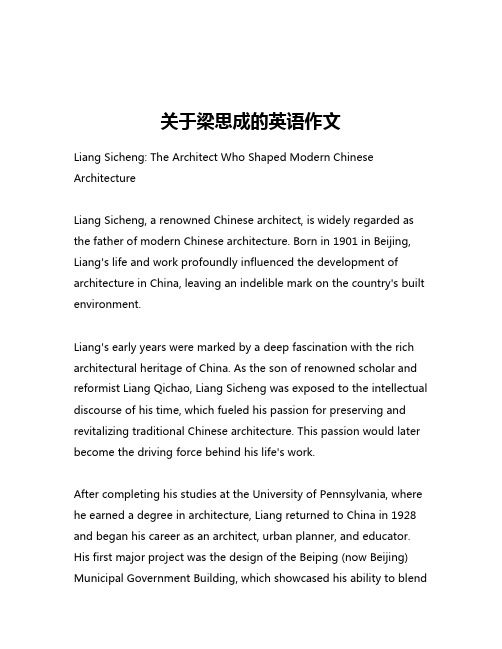
关于梁思成的英语作文Liang Sicheng: The Architect Who Shaped Modern Chinese ArchitectureLiang Sicheng, a renowned Chinese architect, is widely regarded as the father of modern Chinese architecture. Born in 1901 in Beijing, Liang's life and work profoundly influenced the development of architecture in China, leaving an indelible mark on the country's built environment.Liang's early years were marked by a deep fascination with the rich architectural heritage of China. As the son of renowned scholar and reformist Liang Qichao, Liang Sicheng was exposed to the intellectual discourse of his time, which fueled his passion for preserving and revitalizing traditional Chinese architecture. This passion would later become the driving force behind his life's work.After completing his studies at the University of Pennsylvania, where he earned a degree in architecture, Liang returned to China in 1928 and began his career as an architect, urban planner, and educator. His first major project was the design of the Beiping (now Beijing) Municipal Government Building, which showcased his ability to blendtraditional Chinese architectural elements with modern design principles.One of Liang's most significant contributions to Chinese architecture was his tireless efforts to document and preserve the country's architectural heritage. In the 1930s, he embarked on a series of extensive surveys, traveling across China to study and record the country's ancient buildings, temples, and monuments. This meticulous work resulted in the publication of his seminal work, "A History of Chinese Architecture," which is considered a landmark in the field of architectural history.Liang's deep understanding of traditional Chinese architecture and his commitment to preserving its legacy were not merely academic pursuits. He actively advocated for the protection of historic buildings and worked to raise awareness about the importance of architectural conservation. His efforts were instrumental in the establishment of the first national heritage protection laws in China, which laid the foundation for the country's current system of cultural heritage preservation.In addition to his work as an architect and preservationist, Liang was also a respected educator. He played a crucial role in establishing the architecture program at Tsinghua University, where he trained generations of architects who would go on to shape the builtenvironment of modern China. Liang's teaching philosophy emphasized the importance of understanding and respecting traditional Chinese architecture, while also embracing the principles of modernism.Liang's influence extended beyond the realm of architecture. As a public intellectual, he was a vocal advocate for social and political reform, using his platform to address issues such as urban planning, housing, and the role of the built environment in shaping society. His writings and speeches were instrumental in shaping the discourse around the built environment in China during a time of rapid modernization and societal transformation.Liang's legacy continues to be felt in the architecture of contemporary China. Many of the country's most iconic buildings, such as the National Center for the Performing Arts in Beijing and the Guangzhou Opera House, bear the influence of Liang's design principles, which seamlessly integrate traditional Chinese aesthetics with modern architectural techniques.Moreover, Liang's commitment to preserving China's architectural heritage has inspired generations of architects, historians, and preservationists to continue his work. The Liang Sicheng Center for Architectural Heritage at Tsinghua University, established in his honor, serves as a hub for research, education, and advocacy in thefield of architectural conservation.In conclusion, Liang Sicheng's legacy as a pioneering architect, preservationist, and educator has had a profound and lasting impact on the built environment of China. His work has not only shaped the country's architectural landscape but has also influenced the way we understand and appreciate the rich cultural heritage of China. As we continue to navigate the challenges of modernization and urbanization, Liang's vision and principles remain a guiding light for architects, planners, and policymakers, ensuring that the architectural legacy of China is preserved and celebrated for generations to come.。
关于梁思成的英语作文
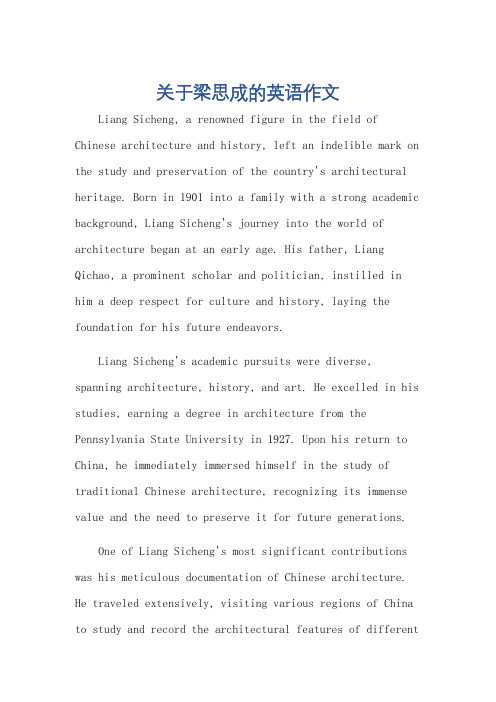
关于梁思成的英语作文Liang Sicheng, a renowned figure in the field of Chinese architecture and history, left an indelible mark on the study and preservation of the country's architectural heritage. Born in 1901 into a family with a strong academic background, Liang Sicheng's journey into the world of architecture began at an early age. His father, Liang Qichao, a prominent scholar and politician, instilled in him a deep respect for culture and history, laying the foundation for his future endeavors.Liang Sicheng's academic pursuits were diverse, spanning architecture, history, and art. He excelled in his studies, earning a degree in architecture from the Pennsylvania State University in 1927. Upon his return to China, he immediately immersed himself in the study of traditional Chinese architecture, recognizing its immense value and the need to preserve it for future generations. One of Liang Sicheng's most significant contributions was his meticulous documentation of Chinese architecture. He traveled extensively, visiting various regions of China to study and record the architectural features of differenteras and styles. His meticulous sketches and detailed notes provided invaluable insights into the history and evolution of Chinese architecture.His work in the field of architectural history was groundbreaking. Liang Sicheng's research and writings on Chinese architecture not only provided a comprehensive understanding of its historical context but alsohighlighted the unique aesthetic and cultural values of various architectural forms. His contributions to the field of architectural historiography are still widely recognized and cited today.Apart from his academic pursuits, Liang Sicheng was also actively involved in the preservation of China's cultural heritage. He was a staunch advocate of protecting historical buildings and sites, often advocating for their conservation and restoration. His efforts in this regard were instrumental in saving numerous historical landmarks from demolition and neglect.Liang Sicheng's legacy is not just in his学术成就 but also in the impact he had on future generations. His passion for Chinese architecture and culture inspired manystudents and scholars to follow in his footsteps. His teachings and example continue to guide those who study and preserve China's rich architectural heritage.In conclusion, Liang Sicheng's life and work are a testament to the importance of preserving and understanding one's cultural heritage. His dedication to the study and preservation of Chinese architecture left an enduring impact on the field, and his legacy continues to inspire and guide those who come after him. His contributions are not just historical but also serve as a bridge to connect the past with the future, ensuring that the rich cultural heritage of China is carried forward for generations to appreciate and cherish.**梁思成:中国建筑的桥梁建造者**梁思成,中国建筑和历史领域的杰出人物,在中国建筑遗产的研究和保护方面留下了不可磨灭的印记。
介绍梁思成的英语文章
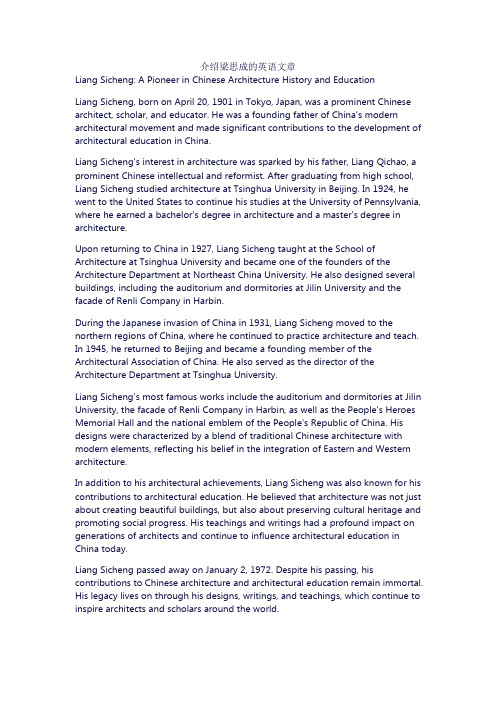
介绍梁思成的英语文章Liang Sicheng: A Pioneer in Chinese Architecture History and EducationLiang Sicheng, born on April 20, 1901 in Tokyo, Japan, was a prominent Chinese architect, scholar, and educator. He was a founding father of China's modern architectural movement and made significant contributions to the development of architectural education in China.Liang Sicheng's interest in architecture was sparked by his father, Liang Qichao, a prominent Chinese intellectual and reformist. After graduating from high school, Liang Sicheng studied architecture at Tsinghua University in Beijing. In 1924, he went to the United States to continue his studies at the University of Pennsylvania, where he earned a bachelor's degree in architecture and a master's degree in architecture.Upon returning to China in 1927, Liang Sicheng taught at the School of Architecture at Tsinghua University and became one of the founders of the Architecture Department at Northeast China University. He also designed several buildings, including the auditorium and dormitories at Jilin University and the facade of Renli Company in Harbin.During the Japanese invasion of China in 1931, Liang Sicheng moved to the northern regions of China, where he continued to practice architecture and teach. In 1945, he returned to Beijing and became a founding member of the Architectural Association of China. He also served as the director of the Architecture Department at Tsinghua University.Liang Sicheng's most famous works include the auditorium and dormitories at Jilin University, the facade of Renli Company in Harbin, as well as the People's Heroes Memorial Hall and the national emblem of the People's Republic of China. His designs were characterized by a blend of traditional Chinese architecture with modern elements, reflecting his belief in the integration of Eastern and Western architecture.In addition to his architectural achievements, Liang Sicheng was also known for his contributions to architectural education. He believed that architecture was not just about creating beautiful buildings, but also about preserving cultural heritage and promoting social progress. His teachings and writings had a profound impact on generations of architects and continue to influence architectural education in China today.Liang Sicheng passed away on January 2, 1972. Despite his passing, his contributions to Chinese architecture and architectural education remain immortal. His legacy lives on through his designs, writings, and teachings, which continue to inspire architects and scholars around the world.。
梁思成工匠精神英文作文
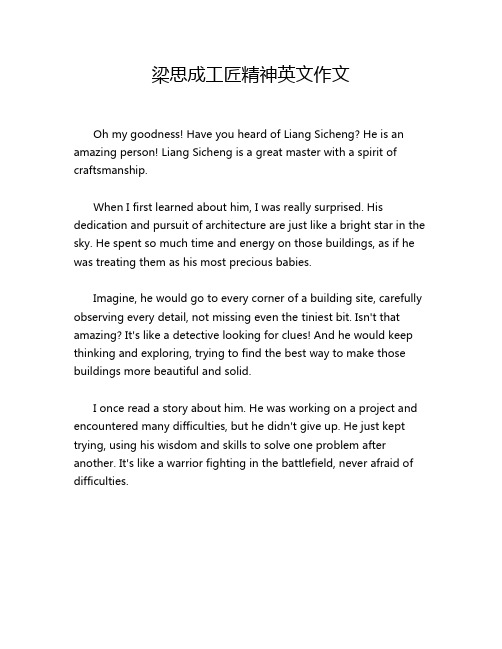
梁思成工匠精神英文作文Oh my goodness! Have you heard of Liang Sicheng? He is an amazing person! Liang Sicheng is a great master with a spirit of craftsmanship.When I first learned about him, I was really surprised. His dedication and pursuit of architecture are just like a bright star in the sky. He spent so much time and energy on those buildings, as if he was treating them as his most precious babies.Imagine, he would go to every corner of a building site, carefully observing every detail, not missing even the tiniest bit. Isn't that amazing? It's like a detective looking for clues! And he would keep thinking and exploring, trying to find the best way to make those buildings more beautiful and solid.I once read a story about him. He was working on a project and encountered many difficulties, but he didn't give up. He just kept trying, using his wisdom and skills to solve one problem after another. It's like a warrior fighting in the battlefield, never afraid of difficulties.We should really learn from Liang Sicheng's spirit of craftsmanship. In our studies and lives, we should also be so dedicated and careful, not afraid of difficulties, and keep working hard to achieve our goals. Just like Liang Sicheng, we should strive to make our lives more meaningful and beautiful. Don't you think so? That's what I really think!。
梁思成我想对你说英语作文100字
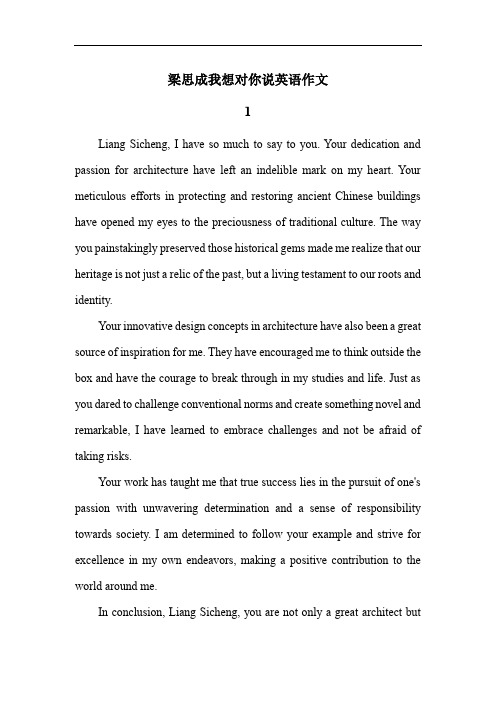
梁思成我想对你说英语作文1Liang Sicheng, I have so much to say to you. Your dedication and passion for architecture have left an indelible mark on my heart. Your meticulous efforts in protecting and restoring ancient Chinese buildings have opened my eyes to the preciousness of traditional culture. The way you painstakingly preserved those historical gems made me realize that our heritage is not just a relic of the past, but a living testament to our roots and identity.Your innovative design concepts in architecture have also been a great source of inspiration for me. They have encouraged me to think outside the box and have the courage to break through in my studies and life. Just as you dared to challenge conventional norms and create something novel and remarkable, I have learned to embrace challenges and not be afraid of taking risks.Your work has taught me that true success lies in the pursuit of one's passion with unwavering determination and a sense of responsibility towards society. I am determined to follow your example and strive for excellence in my own endeavors, making a positive contribution to the world around me.In conclusion, Liang Sicheng, you are not only a great architect butalso a guiding light for me. Your achievements and spirit will always inspire me to move forward on the path of growth and exploration.2Liang Sicheng, I have so much to say to you. Your architectural thoughts have had a profound impact on me. I have been deeply moved by your insistence on the harmonious coexistence of architecture and the environment. This has made me think a lot about the relationship between humans and nature.You always emphasized the importance of integrating buildings into the natural landscape, making them a part of it rather than an intrusion. This concept has opened my eyes to the need for us to respect and protect nature when we build. It has made me realize that our constructions should not only meet our functional needs but also contribute to the beauty and balance of the environment.Another aspect that has inspired me greatly is your unwavering perseverance in the face of difficulties. The challenges you overcame in your architectural career have become a source of motivation for me when I encounter setbacks in my life. Your determination and courage have taught me that giving up is never an option and that with hard work and persistence, any obstacle can be overcome.I am grateful for your contributions and the wisdom you have passed down. Your work and spirit will continue to guide me as I navigate throughlife, making me strive to make a positive impact in my own way.3Liang Sicheng, I have so much to say to you. Your dedication and perseverance in the field of academic research have deeply inspired me. You devoted yourself to the study of ancient architecture, conducting on-site investigations tirelessly. I can imagine the difficulties and challenges you faced during those journeys, but you never gave up. This has taught me that success requires hard work and unwavering determination.Your contribution to architectural education is also something that has had a profound impact on me. You strived to pass on your knowledge and passion for architecture, nurturing countless students. Your efforts have made me cherish every opportunity to learn and grow.I remember reading about your experiences, how you carefully examined every detail of ancient buildings, documenting and analyzing them with precision. Your meticulousness and enthusiasm have shown me the importance of attention to detail and the pursuit of excellence.I am determined to follow in your footsteps, to be as passionate and committed as you were in my own studies and endeavors. I will face challenges with courage and work hard to achieve my goals, just as you did. Thank you, Liang Sicheng, for being a guiding light in my life.Liang Sicheng, I have so much to say to you. Your works have had a profound impact on my perception and appreciation of architecture. The classic buildings you designed are not just structures but masterpieces that blend art and practicality seamlessly.One of your notable designs that captured my imagination was the [mention the specific building]. Its elegant lines, proportionate spaces, and the ingenious use of materials demonstrated a harmony that is truly remarkable. It was as if every element was carefully orchestrated to create a symphony of form and function.Your unique insights into architectural aesthetics have broadened my horizons. You emphasized the importance of respecting the local culture and context in design, which made me realize that architecture is not just about bricks and mortar but a reflection of history and community.Your passion and dedication to preserving traditional architecture also inspire me. In a world that often values modernity at the expense of heritage, you showed us the significance of holding onto our roots.In conclusion, your works and ideas have been a guiding light for me, shaping my understanding of beauty and functionality in the world of architecture. I am grateful for your contributions and the inspiration you have provided.Liang Sicheng, a name that resonates through the corridors of history, has left an indelible mark on my heart. Your dedication to architecture and your unwavering pursuit of preserving the cultural heritage of our nation have been a guiding light for me.I have often found myself lost in the maze of life's uncertainties, but your passion for your career has shown me the way forward. Your commitment to your work, despite the numerous challenges and obstacles, has taught me the value of perseverance and determination. You did not waver in the face of difficulties but instead held firm to your beliefs, constantly striving for excellence in the field of architecture.Your profound love for our country and the desire to safeguard its historical treasures have kindled within me a burning passion to contribute to the betterment of society. Your efforts to protect and restore ancient buildings have made me realize that each of us has a responsibility to preserve our cultural roots and pass them on to future generations.In a world that often values material possessions and immediate gains, your spirit of upholding ideals and remaining true to your vision is like a refreshing breeze. It reminds me that true success lies not in fleeting achievements but in the pursuit of something greater and more meaningful.Liang Sicheng, your life and work have been a source of inspiration, guiding me to stay true to my passions and to strive for a purpose that goesbeyond personal gain. I will carry your spirit with me, endeavoring to make a positive impact on the world around me.。
采访古人对话的作文1400字
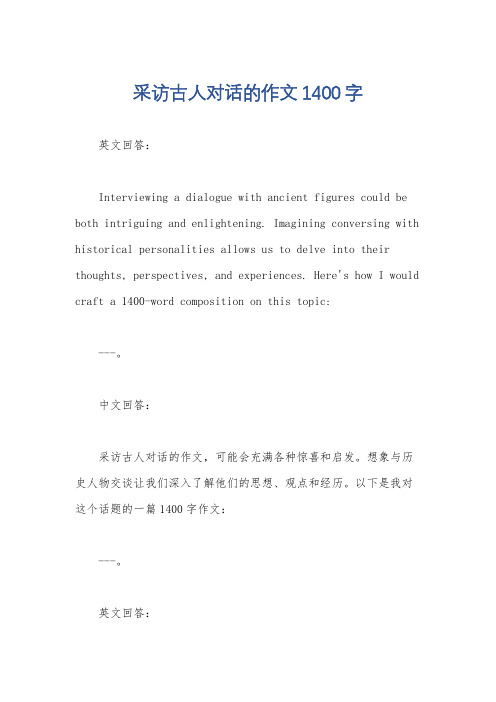
采访古人对话的作文1400字英文回答:Interviewing a dialogue with ancient figures could be both intriguing and enlightening. Imagining conversing with historical personalities allows us to delve into their thoughts, perspectives, and experiences. Here's how I would craft a 1400-word composition on this topic:---。
中文回答:采访古人对话的作文,可能会充满各种惊喜和启发。
想象与历史人物交谈让我们深入了解他们的思想、观点和经历。
以下是我对这个话题的一篇1400字作文:---。
英文回答:Interviewing historical figures in a dialogue format is like unlocking a treasure trove of wisdom and insight. Just imagine having a heart-to-heart conversation with Leonardo da Vinci, Shakespeare, or Cleopatra! Each figure from the past holds unique perspectives, experiences, and lessonsthat could enrich our understanding of history and humanity.As I sit down to interview one of these remarkable individuals, let's say, Julius Caesar, the legendary Roman general and statesman, I would be bursting with questions. From inquiring about his military strategies to hispersonal ambitions, every aspect of his life wouldfascinate me. I might start by asking about his rise to power and the challenges he faced in leading the Roman Empire. Engaging in such a dialogue not only educates but also humanizes these historical figures, making theirstories relatable and relevant to our own lives.Now, let's switch gears and shift to the Chinese language section.---。
关于和梁思成我想对你说的英文作文
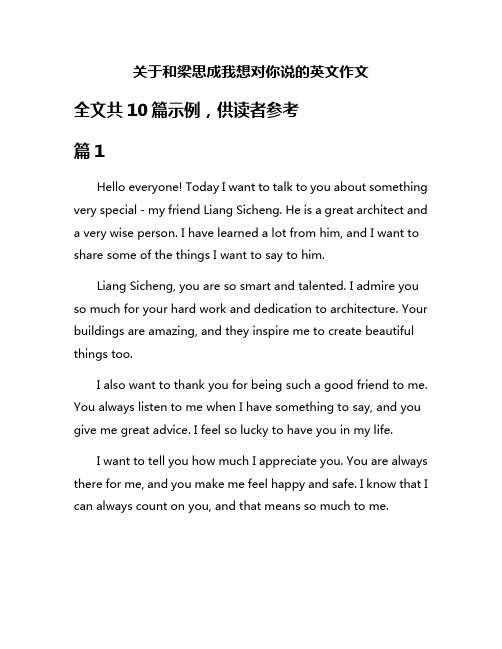
关于和梁思成我想对你说的英文作文全文共10篇示例,供读者参考篇1Hello everyone! Today I want to talk to you about something very special - my friend Liang Sicheng. He is a great architect and a very wise person. I have learned a lot from him, and I want to share some of the things I want to say to him.Liang Sicheng, you are so smart and talented. I admire you so much for your hard work and dedication to architecture. Your buildings are amazing, and they inspire me to create beautiful things too.I also want to thank you for being such a good friend to me. You always listen to me when I have something to say, and you give me great advice. I feel so lucky to have you in my life.I want to tell you how much I appreciate you. You are always there for me, and you make me feel happy and safe. I know that I can always count on you, and that means so much to me.I also want to tell you how much fun I have when we are together. We laugh and play and learn new things. You are so much fun to be around, and I always have a great time with you.Liang Sicheng, I want to thank you for being my friend. You are the best friend anyone could ask for, and I am so grateful to have you in my life. Thank you for everything!So, that's what I want to say to my friend Liang Sicheng. I hope you all have someone as special as him in your lives too. Thank you for listening!篇2Dear Liang Sicheng,Hey! How are you? I want to tell you something. You know, I really admire you. You were such a great architect and scholar. Your work on preserving China's ancient buildings and culture is amazing!I read about how you and your wife, Lin Huiyin, traveled all over China to document ancient buildings. It's so cool that you both worked together to protect our history. I wish I could do something like that one day.I also love how you never gave up, even when things were tough. You faced so many challenges but you always stayed strong and kept going. That's really inspiring to me.I want to be like you when I grow up. I want to study hard and make a difference in the world, just like you did. I hope I can be as brave and determined as you were.Thank you, Liang Sicheng, for all the amazing things you did. You are my hero!With love and admiration,[Your Name]篇3Hey guys, I have something super important to say to all of you! So, I want to talk about my friend Liang Sicheng. He is super cool and I want to tell him how much he means to me.First of all, Liang Sicheng is such a great friend. He always listens to me when I have something on my mind and he gives the best advice. Even when I do something silly, he doesn't get mad at me. He just laughs and makes me feel better. I'm so lucky to have him as a friend.I also want to tell Liang Sicheng how much I admire him. He is so smart and he knows everything about everything. Whenever I have a question, he always has the answer. And he works really hard in school too. I want to be just like him when I grow up.But most of all, I want to tell Liang Sicheng how much I appreciate him. He is always there for me no matter what. He is the best friend anyone could ask for. I hope he knows how much I care about him.So, to Liang Sicheng, if you're reading this, I just want to say thank you for being such an amazing friend. I am so lucky to have you in my life. I hope we can be friends forever. I love you, buddy!篇4Hey guys, I want to tell you something about Liang Sicheng in a more casual and childlike way.Hey Liang Sicheng, I want to tell you that you are a really awesome architect and historian. I admire you so much for your dedication to preserving China's ancient architecture and for your great work on designing the famous Peking University campus.I think it's so cool how you studied abroad in America and Europe to learn more about architecture and urban planning. You really knew how to combine the best of both worlds in your designs.I also want to say thank you for all the hard work you did to protect China's precious historical sites, like the Great Wall and the Forbidden City. It's because of people like you that we can still enjoy these amazing places today.I hope you know how much you inspire me and many other kids to dream big and work hard to make a difference in the world. Keep up the good work, Liang Sicheng!That's all I wanted to say to you, Liang Sicheng. You're my hero!Ok guys, that's it for my little talk about Liang Sicheng. I hope you enjoyed it! See you next time!篇5Dear Liang Sicheng,Hey there! I just wanted to take a moment to tell you how much you mean to me. You are such a great friend and I am so lucky to have you in my life. Your kindness and sense of humoralways brighten my day and I just wanted to say thank you for being such an awesome friend.I also wanted to let you know that I really appreciate all the help you give me with my homework. You are so smart and always willing to explain things to me when I don't understand. You make learning fun and I am so grateful for all the knowledge you share with me.And you know what else? I think you are really cool. You always know the latest trends and have the best ideas for games to play. I love hanging out with you and I always have a blast whenever we are together.So, thank you for being such an amazing friend. I am so lucky to have you in my life and I just wanted to say how much I appreciate you. Can't wait for our next adventure together!Your friend,[Your Name]篇6Dear Liang Sicheng,I want to tell you something. You know, I think you are really smart and cool. I read about you in my school book and I can'tbelieve how much you knew about architecture. You and your wife, Lin Huiyin, were like a super team!I love how you both worked together to help protect China's old buildings. You cared so much about history and making sure old things were not forgotten. That's so awesome!I also think it's really cool how you studied in the United States and brought back all your knowledge to China. You helped to design some amazing buildings that are still standing today. You must have been so talented!I wish I could have met you in person. You sound like a really nice person and I would have loved to hear all your stories. I bet you had a lot of cool adventures in your life.Even though you're not here anymore, I want you to know that I admire you a lot. You are like a hero to me. Thank you for all the amazing things you did for China and for architecture.I hope you are resting in peace and looking down on us witha smile. You will always be remembered as a great architect and a wonderful person.Love,[Your Name]篇7Dear Liang Sicheng,I want to tell you about how awesome you are! You are like a superhero to me, but instead of wearing a cape, you wear glasses and carry around a big brain full of knowledge. You have done so many amazing things and I just have to tell you how much I admire you.First of all, your work in preserving China's historic buildings is so important. You have helped to save so many beautiful old buildings from being torn down and replaced with boring new ones. Thanks to you, we can still see these incredible pieces of history and learn from them. You are like a guardian angel for these buildings, watching over them and making sure they stay safe.And not only are you a great architect, but you are also a wonderful teacher. You have inspired so many people with your passion for preserving history and your love for Chinese culture. Your students are lucky to have you as a mentor, guiding them on their own journeys of discovery and creativity.I also want to thank you for being such a kind and generous person. You always take the time to listen to others and offeryour help and advice. You are like a big brother to me, someone I can look up to and learn from. I hope to be just like you when I grow up, making a positive impact on the world and helping others in need.So, thank you, Liang Sicheng, for being such an amazing person. I am so grateful to have you as a role model and I hope to follow in your footsteps one day. Keep being awesome and never stop doing what you love.With admiration and gratitude,[Your Name]篇8Hi everyone! Today I want to tell you about my feelings for my friend Liang Sicheng. He is a really cool person and I want to share some thoughts with him.Hey Liang Sicheng, I just want to say that you are an awesome friend! I really enjoy spending time with you and talking about all kinds of things. You always listen to me and give me great advice. You are also really smart and helpful in school. Thanks for always helping me with my homework and teaching me new things.I also want to thank you for being so kind and caring. Whenever I'm feeling sad or lonely, you're always there to cheer me up and make me feel better. You're like a big brother to me and I'm grateful to have you in my life.I admire you so much, Liang Sicheng! You are talented in so many ways, whether it's in sports, music, or academics. I love watching you play football and hearing you play the piano. You're so good at everything you do and I look up to you as a role model.I hope we can continue to be great friends and have many more fun adventures together. Let's keep sharing our dreams and supporting each other along the way. Thank you for being an amazing friend, Liang Sicheng!Love you, buddy!篇9Dear Liang Sicheng,I want to tell you that you are a very important person to me. You are not just a teacher, but also a friend. You always help me when I need it, and you teach me new things every day.I remember the time when we went to the park together. You showed me how to fly a kite and we had so much fun. I also remember when you helped me with my math homework. You are very patient and kind, and I really appreciate everything you do for me.I want to say thank you for being such a wonderful teacher and friend. You always make me smile and I am so lucky to have you in my life. I hope we can have more fun adventures together in the future.I also want to say that I will always listen to your advice and try my best to be a good student. I know you believe in me and I want to make you proud.Thank you for everything, Liang Sicheng. I am so grateful to have you in my life.Your student and friend,[Your Name]篇10Dear Liang Sicheng,Hey! How are you? I have something really important to tell you. I want to tell you that you are such an amazing friend and Iam so lucky to have you in my life. You always make me laugh and smile, even when I am feeling down. I appreciate all the fun times we have together and all the memories we have made.I also want to say thank you for always being there for me. Whenever I need someone to talk to or a shoulder to cry on, you are always there to listen and support me. Your kindness and generosity mean so much to me, and I am grateful to have you as a friend.I also admire your creativity and intelligence. You are so talented and have so many great ideas. I love hearing about all the projects you are working on and seeing how passionate you are about your work. I know you are going to achieve great things in the future because you are so dedicated and hardworking.I just wanted to let you know how much you mean to me and how grateful I am to have you as a friend. Thank you for being amazing, Liang Sicheng.Sincerely,[Your Name]。
梁思成工匠精神英文作文
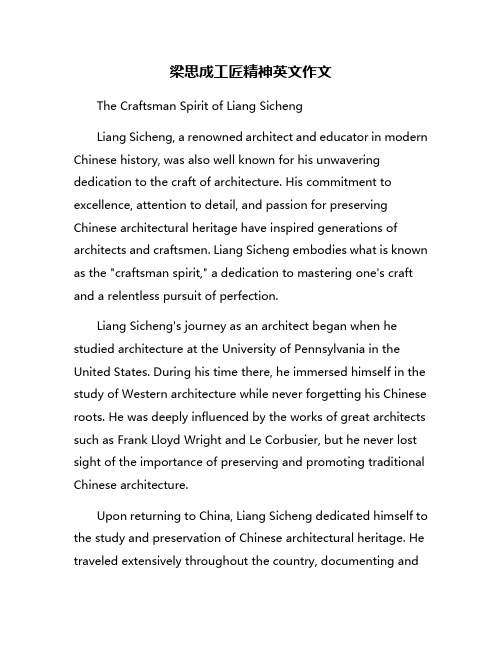
梁思成工匠精神英文作文The Craftsman Spirit of Liang SichengLiang Sicheng, a renowned architect and educator in modern Chinese history, was also well known for his unwavering dedication to the craft of architecture. His commitment to excellence, attention to detail, and passion for preserving Chinese architectural heritage have inspired generations of architects and craftsmen. Liang Sicheng embodies what is known as the "craftsman spirit," a dedication to mastering one's craft and a relentless pursuit of perfection.Liang Sicheng's journey as an architect began when he studied architecture at the University of Pennsylvania in the United States. During his time there, he immersed himself in the study of Western architecture while never forgetting his Chinese roots. He was deeply influenced by the works of great architects such as Frank Lloyd Wright and Le Corbusier, but he never lost sight of the importance of preserving and promoting traditional Chinese architecture.Upon returning to China, Liang Sicheng dedicated himself to the study and preservation of Chinese architectural heritage. He traveled extensively throughout the country, documenting andstudying ancient buildings, temples, and palaces. His exhaustive research and meticulous documentation laid the foundation for the preservation and restoration of many of China's most significant historical sites.Liang Sicheng's commitment to preserving Chinese architecture went beyond academic research. He was directly involved in the restoration and preservation of important historical sites such as the Great Wall, the Forbidden City, and the Temple of Heaven. His hands-on approach to conservation and restoration set a new standard for architectural preservation in China and earned him the reputation as a true craftsman.The craftsman spirit of Liang Sicheng is characterized by his dedication to excellence, his attention to detail, and his passion for preserving Chinese architectural heritage. He was a master of his craft, constantly striving for perfection and never compromising on quality. His work continues to inspire architects, craftsmen, and preservationists around the world, serving as a reminder of the importance of preserving our shared cultural heritage.In conclusion, Liang Sicheng's life and work exemplify the true meaning of the craftsman spirit. His dedication to excellence, attention to detail, and passion for preserving Chinesearchitectural heritage serve as a model for all craftsmen to follow. Liang Sicheng's legacy will continue to inspire generations of architects and craftsmen to strive for perfection in their own work and to never forget the importance of preserving our cultural heritage.。
- 1、下载文档前请自行甄别文档内容的完整性,平台不提供额外的编辑、内容补充、找答案等附加服务。
- 2、"仅部分预览"的文档,不可在线预览部分如存在完整性等问题,可反馈申请退款(可完整预览的文档不适用该条件!)。
- 3、如文档侵犯您的权益,请联系客服反馈,我们会尽快为您处理(人工客服工作时间:9:00-18:30)。
主持人: hello,everyone.today,we invited the Chinese famous scholar
on Research of ancient Chinese architecture liangsicheng.welcome to liangsicheng. 旁白:Liang Sicheng , the son of Liang Qichao ,is an ancient Chinese architecture. He devoted his whole life to proctecting ancient Chinese architecture and explaining the principles of ancient construction by modern scientific methods .
主持人:hello,Mr.liang.welcome to our program.
梁思成: hello.
主持人:Mr.liang.your father is a famous people.So in his influence,how about you when you were a child?
梁思成:I was born in 1901 in Japan Tokyo . When I was very young , I developed a great interest in ancient chinese culture due to my father and started reading old books .I am glad to have a so good father.
旁白:In 1924 , Liang went to United States University of Pennsylvania
to study Architecture . His hardworking and passion to ancient building made him attain architecture bachelor . He said his success secret was constant work that going to library to consult documents and drawing many well-known architectures .
主持人:when you graduated from United States University of Pennsylvania.Did you come back your homeland China?
梁思成:NO,In 1928 , before coming back china , I went to many European countries to visit local famous buildings there . And there , I saw old buildings being protected well and many researchers studying them , which compared with his country ,which made me reflect .
主持人:oh,after visiting the European countries,you have a mind,chinese must study their own architecture and must write out their own Architectural history .is it true?
梁思成:yes,Before long from 1932 to 1941 I and my fellows traveled all over china ,visited more than 2700 ancient architectures . When in 1942 ,I started writing Chinese architecture history , I had been being suffering from sick dieases and in lack of money . And eventually the pain pays , I finished it .
主持人:that’s so good.now does anyone have some qustions?. .................................
主持人:thank you,Mr.liang.our program will end.thank every one.。
